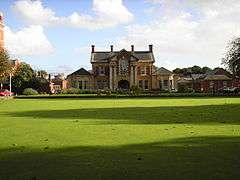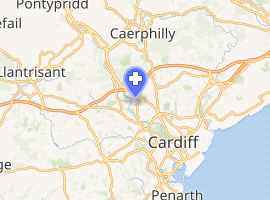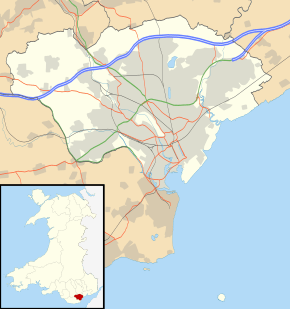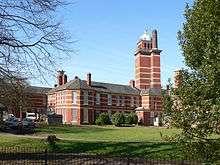Whitchurch Hospital
Whitchurch Hospital (Welsh: Ysbyty'r Eglwys Newydd) was a psychiatric hospital in Whitchurch, an area in the north of Cardiff. It was managed by the Cardiff and Vale University Health Board. The hospital remains a grade II listed building.[1]
| Whitchurch Hospital | |
|---|---|
| Cardiff and Vale University Health Board | |
 Main hospital entrance and bowling green | |

| |
 Shown in Cardiff | |
| Geography | |
| Location | Cardiff, South Glamorgan, Wales, United Kingdom |
| Coordinates | 51.51687°N 3.23184°W |
| Organisation | |
| Care system | Public NHS |
| Type | Specialist |
| Affiliated university | Cardiff University |
| Services | |
| Emergency department | No Accident & Emergency |
| Speciality | Psychiatric hospital |
| History | |
| Opened | 1908 |
| Closed | 2016 |
| Links | |
| Lists | Hospitals in Wales |
History
The population of Cardiff had expanded greatly, from under 20,000 in 1851 to over 40,000 less than 20 years later. By 1890 there were 476 Cardiff residents "boarded out" in the Glamorgan Asylum, and a further 500 to 600 being held in hospitals as far away as Chester and Carmarthen.[2]

Costing £350,000 and ten years to build, the Cardiff City Asylum opened on 15 April 1908. The main hospital building covered 5 acres (2.0 ha), designed to accommodate 750 patients across 10 wards, 5 each for men and women. Like many Victorian institutes, it was designed as a self-contained institute, with its own 150 feet (46 m) water tower atop a power house containing two Belliss and Morcom steam-engine powered electric generator sets, which were only removed from standby in the mid-1980s. The site also contained a farm, which provided both food supplies and therapeutic work for the patients.[2]
The first medical superintendent was Dr Edwin Goodhall, whose then advanced approaches and therapies resulted in the hospital acquiring a reputation at the forefront of mental health care. Patients were also encouraged to take work and supervised tours outside the institute.[2]
During the First World War, the facility was called the Welsh Metropolitan War Hospital.[3] During the Second World War, part of the hospital was turned over to the military, becoming the largest emergency service hospital in South Wales, treating British, American and German personnel. 200 beds were retained for civilian use, which enabled early treatment of post traumatic stress disorder of military patients.[2]
On 5 July 1948, the hospital was taken over by the Ministry of Health as the National Health Service came into existence. After the introduction of Care in the Community in the early 1980s the hospital went into a period of decline and the number of resident patients reduced.[2]
In November 2010 the Cardiff and Vale University Health Board decided that it was preferable to centralise all adult mental health care services at Llandough.[4] The hospital finally closed its doors in April 2016.[5][6]
References
- "Whitchurch Hospital". British Listed Buildings. Retrieved 8 September 2017.
- Carradice, Phil (10 May 2011). "The history of Whitchurch Hospital in Cardiff". BBC Wales. Retrieved 21 June 2012.
- Cracknell, Pete (2005). "Cardiff City Asylum, Whitchurch Hospital". County Asylums. Pete Cracknell. Archived from the original on 28 December 2010. Retrieved 28 December 2010.
Whitchurch Hospital ... Other names/synonyms: Whitchurch asylum, Welsh Metropolitan War Hospital
- "Whitchurch Hospital community loss". theguardian.com. 25 November 2010. Retrieved 5 January 2015.
- Owen, Cathy (15 September 2017). "People arrested trespassing on a derelict Cardiff mental hospital". walesonline. Retrieved 18 September 2017.
- "Whitchurch Hospital: The 'spooky place' that is set to close". BBC. 17 March 2016. Retrieved 4 February 2019.
| Wikimedia Commons has media related to Whitchurch Hospital. |